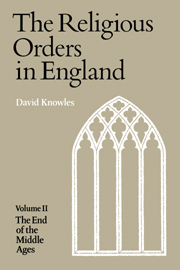Book contents
- Frontmatter
- Contents
- Preface
- List of Abbreviations
- Part One The Historical Framework
- Chap. I The opening of the period
- Chap. II Monks and canons at the university, 130c–1450
- Chap. III Patrons and architects: Ely and Gloucester
- Chap. IV Portraits of monks
- Chap. V Monks and friars in controversy
- Chap. VI Trends in speculation: Ockhamism, justification and grace
- Chap. VII Criticism of the religious in the fourteenth century
- Chap. VIII The spiritual life of the fourteenth century
- Chap. IX Developments within the orders: I
- Chap. X Developments within the orders: II
- Chap. XI The fortunes of the Cluniac houses and the alien priories
- Chap. XII The loosening of discipline
- Chap. XIII King Henry V
- Chap. XIV More portraits of monks
- Chap. XV The second century of visitation, 1350–1450
- Chap. XVI The spiritual life of the fifteenth century
- Part Two The Institutional Background
- Appendix I Chaucer's monk
- Appendix II Henry V and the Westminster recluse
- Appendix III Regulars as bishops
- Bibliography
- Index
Chap. X - Developments within the orders: II
Published online by Cambridge University Press: 28 January 2010
- Frontmatter
- Contents
- Preface
- List of Abbreviations
- Part One The Historical Framework
- Chap. I The opening of the period
- Chap. II Monks and canons at the university, 130c–1450
- Chap. III Patrons and architects: Ely and Gloucester
- Chap. IV Portraits of monks
- Chap. V Monks and friars in controversy
- Chap. VI Trends in speculation: Ockhamism, justification and grace
- Chap. VII Criticism of the religious in the fourteenth century
- Chap. VIII The spiritual life of the fourteenth century
- Chap. IX Developments within the orders: I
- Chap. X Developments within the orders: II
- Chap. XI The fortunes of the Cluniac houses and the alien priories
- Chap. XII The loosening of discipline
- Chap. XIII King Henry V
- Chap. XIV More portraits of monks
- Chap. XV The second century of visitation, 1350–1450
- Chap. XVI The spiritual life of the fifteenth century
- Part Two The Institutional Background
- Appendix I Chaucer's monk
- Appendix II Henry V and the Westminster recluse
- Appendix III Regulars as bishops
- Bibliography
- Index
Summary
THE CARMELITES
The third order of friars, that of the Blessed Virgin Mary of Mount Carmel, had, as has been seen, particularly close associations with England. The English province, therefore, which was the largest in the order, stood to the rest of the body in something of the same relation as did the Italian provinces to the rest of the order of the Austin Hermits; each, as nursing mother, held a special place in the affections of all. This place of honour carried with it a certain precedence: thus both Scotland and Ireland were treated as appendages of England; the provincial chapter had the right (elsewhere reserved to the prior-general and general chapter) of appointing lecturers in the schools of Oxford, Cambridge and London; and English friars were frequently elected vicars-general.
In contrast to the three other orders of friars, the province long remained without internal administrative divisions. Their creation, perhaps early in the fourteenth century, was due to an academic inconvenience, and is an interesting indication of the importance attached to a degree in divinity, at least among the mendicants. It had been found that one region (no doubt that of East Anglia, where the Carmelites were always in strength) had secured a preponderance of students at the university; to remedy this, four ‘distinctions’ had been established, taking their names from London, York, Norwich and Oxford; each of these was to choose four diffinitors to send to the provincial chapter, and from each an equal number of friars was to pass each year to the university, where they were to proceed in rotation to their degrees.
- Type
- Chapter
- Information
- Religious Orders Vol 2 , pp. 144 - 156Publisher: Cambridge University PressPrint publication year: 1979



